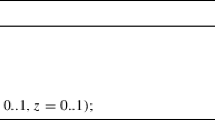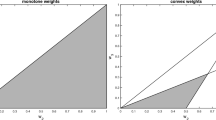Abstract
This essay examines the sensitivity of collective rankings and winners to the weights used in score vectors that are applied to sets of individual rankings to yield collectieve rankings in a typical additive manner. The paper considers probabilities of getting the same winner and the same collective ranking when different score vectors are used for three-element sets. It then discusses the propensities of score vectors to preserve the orginal winner or collective ranking when one or more elements is removed from this ranking and a lower dimensional score vector is applied to the reduced situation. The latter case is examined for three- and four-element sets. The model used for the assessments is based on equally-likely choices of rankings by individuals and applies to situations that involve large numbers of individuals. Roughly speaking, best agreements and minimum sensitivities center around linear (Borda) score vectors. The greatest discrepancies arise from the so-called plurality and reverse plurality score vectors.
Similar content being viewed by others
REFERENCES
Arrow, K. J. (1959), Rational choice functions and orderings. Economica 26: 121–127.
Chernoff, H. (1954) Rational selection of decision functions. Econometrica 22: 422–443.
David, F. N., and Mallows, C. L. (1961). The variance of Spearman's rho in normal samples. Biometrika 48: 19–28.
Gehrlein, W. V. (1981). Single-stage election procedures for large electorates. Journal of Mathematical Economics 8: 263–275.
Gehrlein, W. V. (1979). A representation for quadrivariate normal positive orthnat probabilities, Communications in Statistics — Simulation and Computation 38: 349–358.
Gehrlein, W. V., and Fishburn, P. C. (1980). Robustness of positional scoring rules over subsets of alternatives. Applied Mathematics and Optimization 6: 241–255.
Milnor, J. (1954). Games against nature. In R. M. Thrall, C. H. Coombs and R. L. Davis (Eds.), Decision processes. New York: Wiley.
Nash, J. F. (1950). The bargaining problem. Econometrica 18: 155–162.
Radner, R., and Marschak, J. (1954). Note on some proposed decision criteria. In R. M. Thrall, C. H. Coombs and R. L. Davis (Eds.), Decision processes. New York: Wiley.
Slepian, D. (1962). The one-sided barrier problem for Gaussian noise. Bell Systems Technical Journal 41: 463–501.
Author information
Authors and Affiliations
Additional information
Dr. Gehrlein's research was supported by a grant from the National Science Foundation to the University of Delaware. Department of Business Administration, University of Delaware, Newark, DE 19711.
Rights and permissions
About this article
Cite this article
Gehrlein, W.V., Fishburn, P.C. Scoring rule sensitivity to weight selection. Public Choice 40, 249–261 (1983). https://doi.org/10.1007/BF00114522
Issue Date:
DOI: https://doi.org/10.1007/BF00114522




